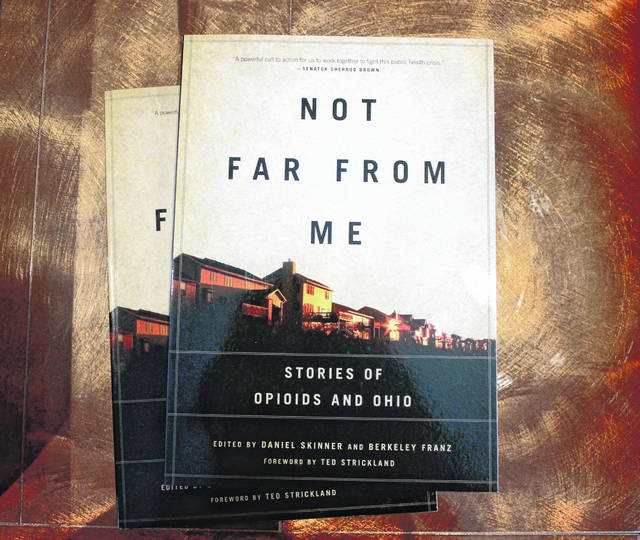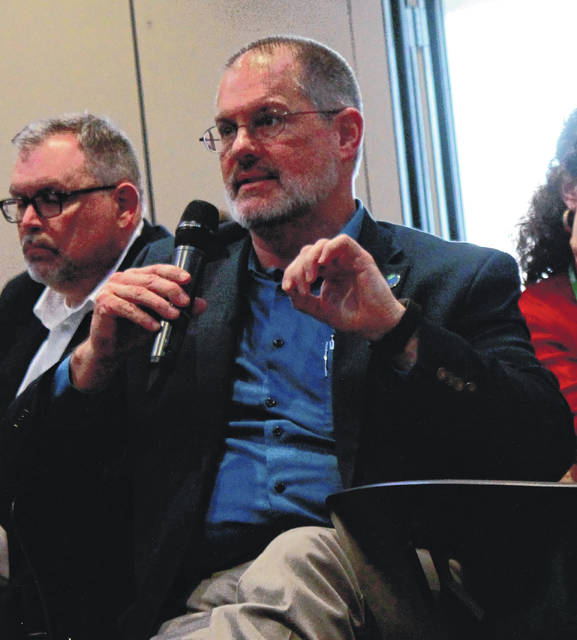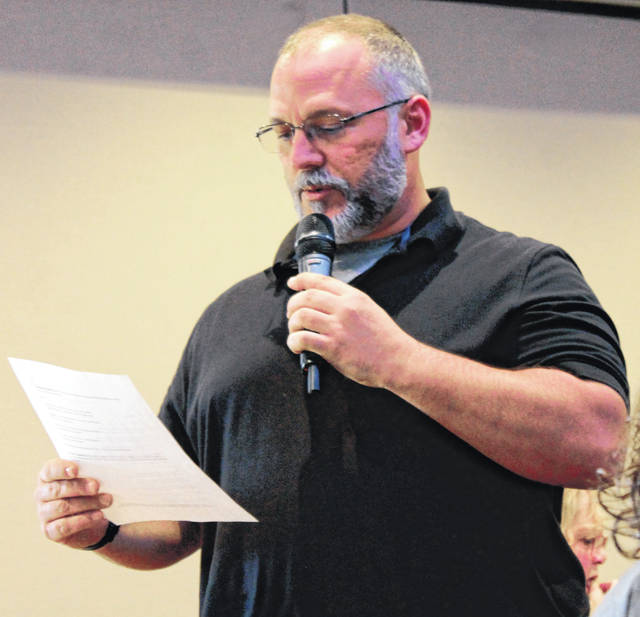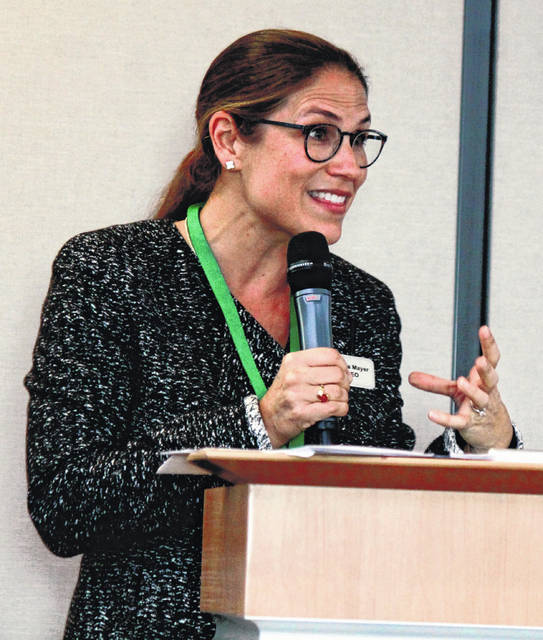



BEAVERCREEK — Local economy and poetry collided Nov. 15 at Soin Medical Center as community leaders and professionals broached a topic relevant to Ohioans of all backgrounds — including Greene County families.
The Mental Health & Recovery Board of Clark, Greene & Madison Counties (MHRB), Ohio University (OU), Ohio Humanities, Greene County Drug-Free Coalition (GCDFC), and Kettering Health Network (KHN) hosted the lunchtime forum titled “Community Conversations: The Economic Impact of the Opioid Crisis in Ohio.”
A book centered the discussion, bringing participants to look closely at one poem and share their own experiences.
“Not Far from Me: Stories of Opioids and Ohio,” edited by OU professors Berkeley Franz and Dan Skinner, shares first-person stories of Ohioans impacted by opioid abuse. It includes 53 contributions — narratives, art, interviews, poetry — from 22 counties, including several from the Dayton region.
Its title was inspired by a poem written by Dayton poet Gerald E. Greene called “Despair.” The poem begins:
There is a place not far from me—
a place of despair.
Its poets tell of life within, where hope is seldom found.
Its fruit of crime
adds pain to discouragement, striking out where it lives, revealing its presence,
and affecting those it loves most.
Heartbreak in community
“At this point in time there is not a subject more relevant to us today than the opioid crisis,” Michael Cain, Manager of Strategic Initiatives and Deployment at KHN, told the audience. “From what we’ve seen in our emergency departments, the patients that come in, the families that are impacted — the husbands, wives, children, mothers and fathers that are caring for these people — it’s just heartbreaking.”
Joe Markiewicz, director of Community Impact on GCDFC, talked about how Purdue Pharma started producing OxyContin and targeted Appalachian states, including Ohio. Ohio ranks second in the country for states affected by opioid abuse, Franz said.
But — as Franz shared — the voices of some who were impacted come alive on the pages of the book.
“The stories that circulate more broadly don’t really do justice of how people have been affected and who’s been affected,” she continued. “It’s a more expansive, larger public health epidemic.”
The co-editors picked a different poem — its author describing how Portsmouth, her home, changed over time — to explore the epidemic’s impact on the economy.
Barbara Costas-Biggs describes a condemned house, a friend’s overdose — with no Narcan to save him, and a town that lost its industry: “the foundry or the coke plant or steel mill.”
According to Tracy Sibbing, vice president of Community Impact at United Way of Greater Dayton, missed Greene County revenue for 2018 related to drug overdose deaths was $380,000. The total includes personnel costs, equipment, EMS billing, and Narcan to respond to 400 overdose calls from July 2017 to August 2018.
Sibbing also cited 50 percent of children taken into child protective custody have parents using drugs.
“With this epidemic we have decimated families,” Sibbing said. “The economic implications to families — grandparents who live on a fixed income and are now caring again for small children in their homes — I can’t even quantify that. I have no way of putting data together to tell that story but it’s an important story.”
When it comes to the workforce, Markiewicz said he hears stories of employees or potential hires who can’t pass drug and alcohol tests.
“How do we help build that area up for our businesses?” Markiewicz asked. “If we can keep (these people) straight, keep them away from their addiction and help them walk through this life, our tax base will increase in our community, (there will be) less reliance on government support systems, and it’s a win-win between businesses, chambers and those folks who are working in the prevention field.”
Young people, he said, need to be seen as prevention partners.
“They are the next wave coming up in our community,” he said. “We need to prime them and get the right norming in their head that drugs are not the way to go … we need to have a caring school environment for the mental health issues associated with the trauma with our young people today.”
Beyond despair: hope
“Not Far from Me” challenges common understandings of opioid abuse and the stigma that surrounds it.
“There are a lot of negative stories out there that you may have heard of — that Ohio is ground zero, that people don’t typically recover from opioid abuse, that Narcan is enabling and doesn’t help the individual in need,” Franz said. “There are a lot of powerful stories that aren’t being told about the way people are advocating and learning new ways to support addiction recovery … Anybody can be affected, any family, any community, and we all have some connection and responsibility to play in addressing it.”
In response to the poem, State Sen. Bob Hackett called out one missing piece.
“There’s gotta be hope,” he said.
Community members can join the Greene County Drug-Free Coalition, which meets 9-10:30 a.m. the second Thursday of each month at The Hope Spot, 335 E. Market St., Xenia. The coalition focuses on prevention, treatment, recovery and support.
Businesses can participate in a technical assistance clinic to audit their drug-free policies and operations against best-practice strategies to help boost employee hiring and retention. The clinic will be held 9 a.m. to 4 p.m. Tuesday, Jan. 14 at Brinkman Center, 100 S. Limestone St., Springfield. Cost is $25. Registration is available at TAclinic.eventbrite.com.





